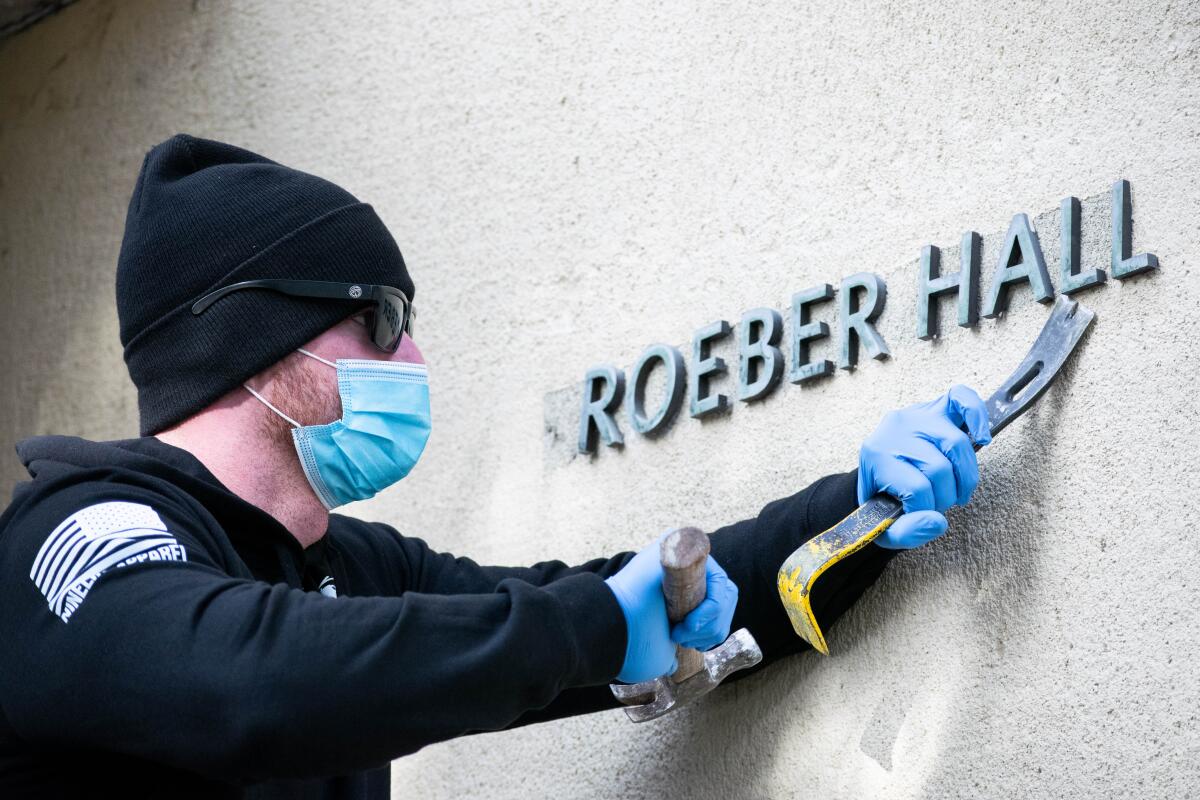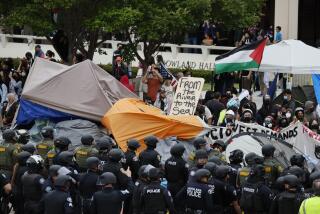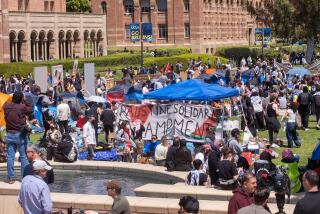Editorial: The real way UC Berkeley can make up for disrespect toward Native Americans

Time was when museums and universities piled up troves of Native American bones found during archaeological digs, as well as funerary items and other relics. Museums of natural history felt no compunction about putting the remains, hundreds of years old, on exhibit to be goggled at by visitors, something they wouldn’t have done with European skeletons of the same vintage.
Even after these organizations took down their morbid displays, they refused to return those items to the people who had a rightful claim on them for respectful treatment. The bones — thousands of them — were needed for study, these organizations claimed while storing them in warehouses where they typically went ignored for years.
UC Berkeley has been among the worst offenders. Congress mandated the repatriation of the bones in 1990, but the law affected only what belonged to federally recognized tribes, and many of California’s Indigenous groups have been denied that status. Since the law was passed, the university has returned a fraction of the items in its possession. It still has 8,000 ancestral remains and 10,000 objects.
It needs to make amends by returning all of this as quickly as possible. Unfortunately, last week it tried to show a newfound level of sensitivity in a different and ill-conceived way: by taking the name of Alfred Kroeber, a respected former professor who focused on California’s Native communities, off the anthropology department building.
Unlike some others who’ve been “unnamed,” Kroeber, who worked largely in the first half of the 20th century, was no slave owner or promoter of eugenics. Instead, he was a leader in the fight against white-superiority beliefs and worked to preserve Native cultures, including recording their songs and spoken language. Faculty members have fought against the dishonor being visited on him, saying it was done largely in secrecy and without asking for their scholarly opinion.
So why was his legacy targeted? Kroeber was certainly among the scientists who contributed to the store of remains and artifacts at UC Berkeley. He wrote an analysis of the Ohlone people saying their culture was becoming extinct; that testimony was among the factors that kept the Ohlone from being federally recognized as a tribe. His critics also fault him for his role in bringing Ishi, the last or one of the last members of the Yahi tribe from the Lassen area, to the Bay Area. Among other things, Ishi would give Sunday talks and demonstrations about his culture, which some saw as using him as a performing curiosity. And when Ishi died, his body was autopsied, against what had been his wishes and the beliefs of his tribe.
But Nancy Scheper-Hughes, a professor emeritus of anthropology who is closely acquainted with Kroeber’s life and work, said the university didn’t get an accurate picture of his actions or their context. Most anthropologists and museums were collecting bones early in the 20th century, when it was legal and widely accepted; the Smithsonian had a far bigger collection than Berkeley. The Ohlone didn’t begin reclaiming their language and culture until long after Kroeber’s testimony was completed; he may have been shortsighted, but he was not inaccurate at the time he reached his conclusion.
As for Ishi, Scheper-Hughes says that he was asked multiple times if he wanted to return to his homeland, but he was vehemently against the idea. He enjoyed sharing his culture with others and during those times would be recorded by Kroeber on wax cylinders to preserve the language of his people. (Ishi was not his real name; it was the word for “man,” which Kroeber used out of respect for the beliefs of Ishi’s tribe that a person had to be introduced by another member of the tribe for his name to be used. There were no other members of Ishi’s tribe to make introductions.)
Kroeber was on sabbatical and out of town when Ishi died. He sent telegrams adamantly opposing the autopsy, Scheper-Hughes said, and was devastated that it had taken place — and yet, after he returned and the damage was done, he wrongly participated in sending Ishi’s brain to the Smithsonian.
Decisions about stripping honors can be fraught. People are seldom all bad or all good, and the bad tends to stand out when viewed many years later in more enlightened times. In this case, the university made a mistake; Kroeber’s defense of Native Americans, his respect for their cultures and his studies to preserve those cultures should have weighed more heavily in the deliberations about Kroeber Hall.
He has been used as a symbol for the real problem: UC Berkeley’s shamefully sluggish efforts to repatriate thousands of items that do not rightly belong to it. A new state law requires the return of items to any Native Californian groups whether or not they are federally recognized. University officials should put the blame on their own shoulders, where it belongs, delay no longer, and work with California’s Native people to restore these items quickly and respectfully.
More to Read
A cure for the common opinion
Get thought-provoking perspectives with our weekly newsletter.
You may occasionally receive promotional content from the Los Angeles Times.










